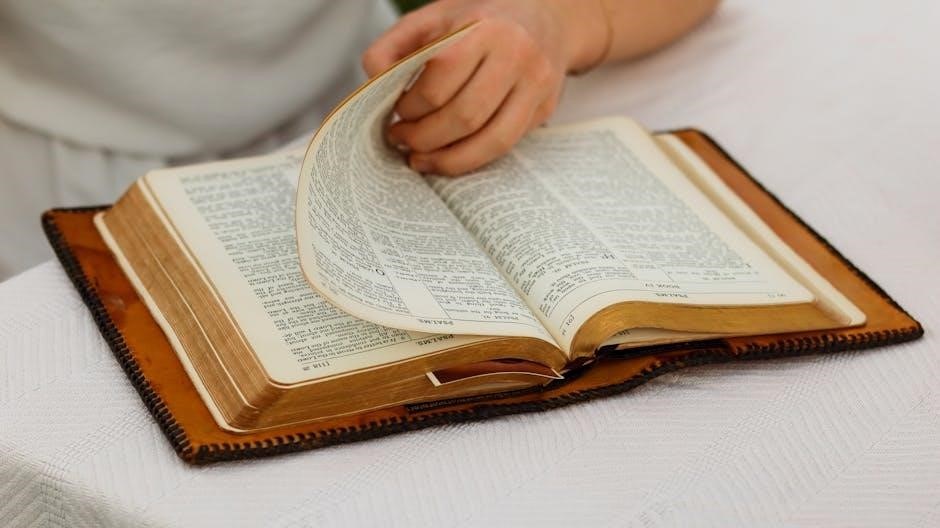The Book of Discipline UMC PDF is the official governing document of the United Methodist Church, outlining its polity, doctrines, and operational guidelines for church governance and ministry.
What is the Book of Discipline?
The Book of Discipline is the official governing document of the United Methodist Church (UMC), serving as its constitution and doctrinal foundation. It outlines the church’s polity, laws, and organizational structure, providing guidance for its members, clergy, and institutions. The book is updated periodically by the General Conference, the UMC’s top legislative body, to reflect evolving beliefs, practices, and societal changes. It includes doctrines, social principles, and operational guidelines, ensuring unity and accountability across the global denomination. The Book of Discipline is essential for understanding the UMC’s identity, mission, and governance, making it a critical resource for both leaders and laity seeking to navigate the church’s policies and practices.
The Purpose and Importance of the Book of Discipline
The Book of Discipline serves as the foundational document for the United Methodist Church, providing a framework for governance, doctrine, and ethical standards. Its primary purpose is to ensure unity and consistency across the denomination by establishing clear guidelines for church operations, clergy conduct, and congregational life. It also reflects the church’s commitment to social justice and moral principles, guiding members in living out their faith responsibly. By outlining policies and procedures, the Book of Discipline fosters accountability and order within the church, enabling effective decision-making and mission-oriented practices. Its importance lies in its role as a unifying force, helping the UMC navigate complex theological and practical challenges while remaining true to its mission and values.
Structure and Organization of the Book of Discipline
The Book of Discipline is divided into multiple parts, each addressing specific aspects of church governance and doctrine. It begins with the Constitution of the United Methodist Church, followed by the Doctrinal Standards and the General Rules. The majority of the book is dedicated to the Discipline, which outlines the laws, policies, and procedures for the church. This includes sections on church membership, clergy responsibilities, and organizational structures. The text is further organized into chapters and paragraphs for easy reference. Appendices provide additional resources, such as forms and historical documents. This structured format ensures clarity and accessibility, making it a vital resource for both clergy and laity seeking to understand the church’s governance and practices.

Historical Background of the Book of Discipline
The Book of Discipline traces its roots to John Wesley’s early Methodist movements, evolving through key events and amendments to guide the UMC’s doctrine and governance.
Early Foundations and Development
The Book of Discipline has its roots in John Wesley’s foundational documents, including the General Rules (1739) and the Large Minutes (1784). These early texts outlined Methodist doctrine, governance, and ethical guidelines, serving as the blueprint for the modern Discipline. The first official Book of Discipline was adopted in 1784 at the Christmas Conference, formalizing the structure and beliefs of the newly formed Methodist Episcopal Church. It incorporated Wesley’s teachings, emphasizing personal holiness, social justice, and connectional church governance; Over time, the Discipline evolved to address emerging issues, yet its core principles remained grounded in Wesleyan theology. This foundational document has since become central to United Methodist identity and practice.
Evolution Over the Years
The Book of Discipline has undergone significant changes since its inception, adapting to the evolving needs of the church and society. Initially, it reflected John Wesley’s teachings, but as the Methodist movement grew, so did the need for updated governance and doctrine. The merger forming the United Methodist Church in 1968 brought substantial revisions, expanding its scope to address modern theological and social issues. Over the decades, the Discipline has been amended to reflect shifting cultural norms, advances in biblical scholarship, and the church’s global expansion. These updates ensure the document remains relevant while maintaining its core Wesleyan principles. This evolution demonstrates the church’s commitment to balancing tradition with contemporary challenges.
Key Amendments and Revisions
The Book of Discipline has undergone numerous key amendments and revisions to reflect the evolving values and challenges of the United Methodist Church. Significant changes include updates to the church’s stance on social issues, such as human sexuality and racial justice, which have sparked both support and controversy. These amendments often arise from General Conference decisions, ensuring the church remains responsive to modern societal changes. The revision process involves careful consideration by church leaders and members, aiming to balance traditional teachings with contemporary needs. These changes are crucial for maintaining the church’s relevance and addressing the diverse perspectives within its global community, ensuring that the Book of Discipline remains a dynamic and guiding document for United Methodists worldwide.

Core Doctrines and Teachings
The Book of Discipline outlines the United Methodist Church’s core beliefs, emphasizing grace, the Trinity, and the authority of Scripture. It guides the church’s mission and practices, reflecting a commitment to spiritual growth and social holiness, while upholding Wesleyan traditions that unite Methodists worldwide.
United Methodist Beliefs and Principles
The United Methodist Church is rooted in Wesleyan theology, emphasizing God’s grace, the Trinity, and the authority of Scripture. Core beliefs include salvation through faith in Jesus Christ, the importance of the Holy Spirit’s work in sanctification, and the call to live out faith in love and service. The Book of Discipline highlights the church’s commitment to personal and social holiness, reflecting John Wesley’s emphasis on both spiritual growth and societal transformation. Key principles such as the means of grace, compassion, and justice are central to UMC identity. These beliefs guide the church’s mission to make disciples of Jesus Christ and foster a community of believers dedicated to serving others.
Doctrinal Standards and Theological Positions

The Book of Discipline outlines the United Methodist Church’s doctrinal standards, rooted in the Articles of Religion and the Confessions of the Evangelical United Brethren Church. It affirms the Trinity, the sovereignty of God, and the authority of Scripture as primary theological foundations. Key doctrines include the necessity of salvation through Jesus Christ, the role of the Holy Spirit in sanctification, and the importance of grace prevenient, justifying, and sanctifying. These standards emphasize the Wesleyan understanding of entire sanctification as a possibility for believers. The Book also addresses theological positions on sacraments, such as baptism and the Lord’s Supper, as means of grace. These doctrinal standards serve as the theological framework guiding the church’s ministries and practices, ensuring consistency and fidelity to its heritage.
Social Principles and Moral Guidelines
The Book of Discipline outlines the United Methodist Church’s social principles, which serve as moral guidelines for addressing contemporary issues. These principles emphasize the importance of human dignity, justice, and compassion, calling the church to advocate for the marginalized. Key areas include racial justice, gender equality, and the rights of all individuals regardless of sexual orientation. The Book also addresses ethical concerns like poverty, healthcare, and environmental stewardship, urging believers to live out their faith in transformative ways. These principles are not laws but rather a framework for discerning God’s will in society, guiding United Methodists to work toward a more just and peaceful world. They reflect the church’s commitment to social holiness and its mission to make disciples of Jesus Christ.

Recent Updates and Changes
The Book of Discipline undergoes periodic revisions to reflect evolving needs and values of the United Methodist Church, ensuring its teachings remain relevant and impactful.
2019 General Conference and Its Impact
The 2019 General Conference marked a pivotal moment for the United Methodist Church, addressing contentious issues, particularly regarding human sexuality. The conference saw the adoption of the Traditional Plan, which reaffirmed the church’s stance against same-sex marriage and the ordination of LGBTQ+ clergy. This decision sparked widespread controversy, leading to heightened tensions within the denomination. Many viewed the outcome as a step backward in inclusivity, while others saw it as a commitment to traditional teachings. The conference also highlighted deep divisions, prompting discussions about potential church splits and disaffiliations. The emotional and theological impact of the 2019 General Conference continues to shape the UMC’s identity and future trajectory.
Removal of Statements on Homosexuality
The Book of Discipline has historically included statements regarding homosexuality, which have been a source of significant debate within the UMC. Recent editions have seen efforts to remove or revise language deemed exclusionary or harmful. For instance, the 2023 edition reflected shifts in the church’s approach, with some annual conferences and jurisdictions adopting more inclusive policies. However, the process of removing such statements has been slow and contentious, reflecting broader theological and cultural divides. These changes aim to align the Discipline with the UMC’s emphasis on grace and inclusion, though challenges remain in achieving full consensus. The removal of restrictive statements is seen as a step toward greater equity and acceptance within the denomination.
Current Policies and Practices
The Book of Discipline outlines the current policies and practices of the United Methodist Church, serving as a guide for governance, ethics, and mission. It addresses key issues such as ordination, marriage, and human sexuality, reflecting the church’s evolving stance on inclusive ministry. While the Discipline maintains traditional teachings, recent updates aim to balance diverse perspectives within the global church. Ongoing debates over interpretation and application highlight tensions between unity and diversity. Despite challenges, the Book of Discipline remains a foundational document, shaping the UMC’s practices and ensuring accountability among its members. It continues to be a vital resource for clergy and laity alike, guiding the church’s mission and witness in a changing world.
Challenges and Controversies
The UMC faces significant challenges, including theological divides, social debates, and potential schisms, threatening unity and prompting difficult conversations about tradition versus progress in governance.
The Role of LGBT Issues in the UMC
LGBT issues have been a central point of contention within the UMC, reflecting broader societal debates about inclusion and equality. The Book of Discipline has historically contained statements labeling homosexuality as “incompatible with Christian teaching,” sparking intense disagreement. Progressive voices advocate for full inclusion of LGBT individuals in all aspects of church life, while traditionalists emphasize upholding existing doctrines. The 2019 General Conference highlighted these divisions, leading to proposals for separation within the denomination. These debates have deeply impacted clergy, congregants, and the church’s global witness, with many calling for a more inclusive and affirming stance. The ongoing tension over LGBT rights continues to shape the UMC’s identity and future direction.
Conservative vs. Liberal Perspectives
Within the UMC, there is a significant divide between conservative and liberal perspectives regarding the Book of Discipline. Conservatives emphasize upholding traditional doctrines and resisting changes to established teachings, particularly on issues like sexuality and marriage. They view the Book of Discipline as a foundational document that should maintain its current stance to preserve the church’s historical integrity. Liberals, however, advocate for a more progressive interpretation, seeking to adapt the Book of Discipline to contemporary social norms and promote greater inclusivity for all members. These differing viewpoints have led to ongoing debates and challenges within the denomination, reflecting broader societal shifts and theological differences that continue to shape the UMC’s future.
Church Schisms and Disaffiliations
The Book of Discipline has been a focal point in the growing tensions leading to church schisms and disaffiliations within the UMC. Disagreements over doctrinal interpretations and social issues have prompted some congregations to seek disaffiliation, often citing alignment with more conservative or progressive values. The Book of Discipline outlines the formal processes for disaffiliation, ensuring adherence to legal and procedural standards. These separations reflect deeper divisions within the denomination, as churches navigate their theological and cultural identities. While some view disaffiliation as a necessary step to maintain integrity, others see it as a tragic fracturing of unity. The rise in disaffiliations underscores the challenges of maintaining a cohesive denomination amid significant theological and social change.

Accessing the Book of Discipline
The Book of Discipline is readily available in PDF format on official UMC websites, ensuring easy digital access for clergy and laity. Print copies can be purchased through Cokesbury and other authorized retailers, providing a tangible resource for study and reference. Additionally, guides and companion resources are offered to aid in understanding and interpreting the content effectively.
PDF Versions and Digital Availability
The Book of Discipline is widely available in PDF format, accessible through the official United Methodist Church website and other denominational platforms. This digital version is free to download, enabling easy access for clergy, laity, and anyone interested in the governance and doctrines of the UMC. Regular updates ensure the PDF reflects the most recent amendments and revisions, making it a reliable resource for understanding church policies. The PDF is compatible with various devices, including smartphones, tablets, and computers, allowing for convenient reading and reference. Additionally, downloadable sections or chapters are often provided for those who wish to focus on specific areas without accessing the entire document. Archival PDF versions are also maintained for historical research and reference purposes, while denominational offices frequently share direct links to ensure accessibility and authenticity.
Print Copies and Official Sources
Print copies of the Book of Discipline are available through official United Methodist sources, including the Cokesbury store and other authorized denominational retailers. These physical editions are published periodically to reflect updates and revisions, ensuring clergy and laity have access to the most current version; Purchasing from official sources guarantees authenticity and accuracy, as unauthorized sellers may distribute outdated or altered content. Print copies are often preferred for their ease of reference during meetings, studies, and decision-making processes. Additionally, many local churches and annual conferences maintain print copies for shared use. The publication is typically available in paperback or hardcover formats, with clear typography and comprehensive indexing to facilitate easy navigation. Readers are encouraged to verify the publication date to ensure they have the latest edition, as updates are regularly incorporated following General Conference decisions.
Guides and Resources for Understanding
To aid in understanding the Book of Discipline, numerous guides and resources are available, including official study guides published by Cokesbury and other denominational sources. These resources provide in-depth explanations of key doctrines, policies, and organizational structures. Online webinars, workshops, and commentaries from trusted United Methodist scholars and leaders offer additional insights. The UMC’s official website and related denominational platforms host downloadable resources, such as study guides and FAQs, to help navigate the document. Clergy, laity, and scholars often rely on these tools to interpret complex theological and administrative content. These resources are particularly useful for newcomers seeking to grasp the foundational principles of the UMC and its governance. They complement the Book of Discipline by offering practical applications and historical context.

The Book of Discipline and Church Governance
The Book of Discipline outlines the organizational and governance framework of the UMC, detailing its structure, policies, and decision-making processes to ensure accountability and connectional unity.

Church Structure and Polity
The United Methodist Church operates under a connectional polity, blending episcopal, presbyterian, and congregational elements. The Book of Discipline details this structure, emphasizing shared governance and accountability. At the top, the General Conference sets overall policies, while Jurisdictional and Annual Conferences address regional matters. Districts and local churches function within this framework, guided by bishops and clergy. This system ensures unity and diversity, balancing centralized leadership with local autonomy. The Discipline outlines roles, responsibilities, and processes, ensuring effective decision-making and resource sharing across the connection, thereby fostering a cohesive and missional church body globally and locally.
Role of General Conference
The General Conference is the supreme legislative body of the United Methodist Church, convened every four years to determine the church’s official policies and direction. As outlined in the Book of Discipline, it is composed of delegates elected from annual conferences worldwide. The General Conference has the authority to revise the Book of Discipline, approve or reject petitions, and address critical issues affecting the global church. Its decisions shape the UMC’s stance on doctrine, governance, and social issues, requiring a majority vote for approval. This body ensures the church remains aligned with its mission and values, reflecting the collective voice of its membership. Its rulings are binding and guide the church until the next Conference.
Local Church Governance and Accountability
Local church governance in the UMC is structured to ensure accountability and alignment with the denomination’s mission. The Book of Discipline outlines the roles of the pastor, church council, and committees, such as the Staff-Parrish Relations Committee and the Finance Committee, which oversee operations and resources. Churches are accountable to their annual conference through the Charge Conference, an annual meeting where leaders review the church’s affairs and set goals. This system ensures transparency and fidelity to United Methodist principles while allowing flexibility for local contexts. Accountability is balanced with autonomy, enabling churches to adapt to their communities while remaining connected to the broader UMC structure and standards.

Future Prospects and Reforms
The Book of Discipline may undergo reforms to address modern challenges, ensuring its relevance while maintaining the UMC’s core values. Ongoing dialogue and adaptive governance will guide its evolution.
Potential Reforms and Modernization
The Book of Discipline may see reforms to reflect modern societal changes and theological shifts within the UMC. Proposals could include updating governance structures to enhance inclusivity and efficiency. Digital integration, such as expanded online accessibility, could also be explored to reach a broader audience. Additionally, reforms might address controversial issues like human sexuality and church unity, aiming to foster a more equitable and compassionate framework. These changes could help the UMC adapt to global diversity while maintaining its foundational principles. Modernization efforts will likely focus on balancing tradition with progress, ensuring the Book of Discipline remains a relevant guide for future generations.

Efforts to Maintain Unity
The Book of Discipline plays a crucial role in fostering unity within the United Methodist Church by providing a shared framework of beliefs and practices. It emphasizes the importance of maintaining connectionalism, which binds local churches together in a global community. The Book encourages dialogue and collaboration across diverse perspectives, promoting empathy and understanding. It also outlines processes for resolving conflicts and addressing disagreements in a constructive manner. By adhering to its principles, the UMC strives to preserve its identity while embracing diversity. These efforts aim to strengthen the church’s cohesion, ensuring that unity remains a cornerstone of its mission and witness in the world.
Global Implications and Challenges
The Book of Discipline holds significant implications for the global United Methodist Church, as it guides practices and doctrines across diverse cultural and regional contexts. Its teachings must be interpreted and applied in varied settings, which can lead to challenges in maintaining consistency. The global nature of the UMC means that decisions made by the General Conference impact churches worldwide, often requiring careful consideration of regional perspectives. Differences in cultural values and theological understandings, particularly on controversial issues, can create tension and test the church’s ability to remain unified. Additionally, the Book of Discipline must address global challenges such as injustice, poverty, and human rights, ensuring its relevance and effectiveness in a rapidly changing world.
The Book of Discipline is a cornerstone document guiding the United Methodist Church, shaping its identity, practices, and future. Its principles and policies foster unity and integrity, ensuring the UMC remains a beacon of faith and service globally.
Final Thoughts on the Book of Discipline
The Book of Discipline serves as the foundational guide for the United Methodist Church, outlining its beliefs, practices, and governance. It reflects the denomination’s commitment to theological integrity and social justice. By providing clear doctrines and ethical standards, it equips leaders and members to navigate complex issues with faithfulness. Its evolution over time demonstrates the UMC’s ability to adapt while remaining rooted in Wesleyan traditions. As a digital resource, the Book of Discipline PDF ensures accessibility for global engagement. Ultimately, it remains a vital tool for fostering unity and guiding the church toward a future of compassion, inclusion, and missional effectiveness.
Its Role in Shaping the UMC
The Book of Discipline has been instrumental in shaping the identity and practices of the United Methodist Church. It serves as the primary governing document, ensuring consistency in doctrine, polity, and mission across the denomination. By providing a shared theological framework, it unites diverse congregations under common principles. The Book of Discipline also guides decision-making at all levels, from local churches to the General Conference, fostering accountability and integrity. Its influence extends to shaping pastoral practices, educational programs, and social justice initiatives. As a dynamic document, it continues to adapt to contemporary challenges while remaining rooted in Wesleyan traditions, ensuring the UMC remains a relevant and compassionate force in the global church.

Leave a Reply
You must be logged in to post a comment.